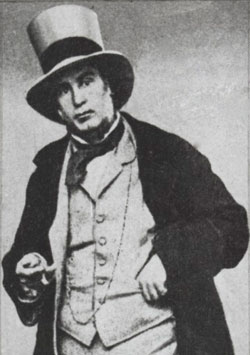
Council of Heads of Australasian Herbaria
Australian National Herbarium
Biographical Notes
 |
Council of Heads of Australasian Herbaria |
 Hopwood, Henry (1813 - 1869)
Hopwood, Henry (1813 - 1869)Born in Bolton, Lancashire, UK, 1813; died of typhoid in Echuca, 1869.
Hopwood was arrested in 1834 for receiving stolen rolls of silk, and sentenced to 14 years' transportation to Van Diemen's Land (Tasmania). A persuasive and manipulative character, within a year of arriving in the colony, Hopwood had been appointed as a police constable. However, he often found himself in trouble, mainly due to dalliances with women, and in 1839, he was sentenced to two years' servitude at the Port Arthur penal settlement for 'aiding and abetting the abduction of his master's daughter'. He was eventually released and, in 1846, granted a full pardon after having served 12 years of his original sentence.
Hopwood migrated to the fledging colony of Port Phillip (Melbourne) where he worked his way north to the Murray River in 1848. Here he found work in a tallow plant, boiling down animal carcasses to extract their fat and oils, eventually becoming foreman. By 1850 the shrewd Hopwood noted the increasing numbers of drovers and farmers in the area, and used his savings to build both a hotel and a punt. He charged a small fee for river crossings and profited from drinkers at his hotel. By 1858 he had almost single-handedly expanded the lonely riverbank site into a small town, complete with a pontoon bridge, newspaper, school, warehouses and vineyards. The following year Hopwood constructed the Bridge Hotel, a more stylish double-storey brick building that still stands today.
Based on his record, Hopwood was a competitive, irascible and sometimes arrogant character who frequently became involved in petty feuds. On one occasion a large bucket from his river punt went missing; Hopwood placed an advertisement in the local newspaper stating that all punt crossings would be suspended until the bucket was returned, thereby halting all interstate transport and business.
Hopwood was married three times. His first wife and an infant son in England were left behind after he was transported; Hopwood never saw them again. He remarried in Melbourne in 1854 and again in 1860 following the death of his second wife. He had one child, a daughter, with his second wife.
Hopwood himself died of typhoid in 1869. He has gravestones in both Echuca Cemetery and the Melbourne General Cemetery, and his Echuca grave is a popular tourist destination because his body is buried in Echuca and not in Melbourne.
Source: Extracted from: http://en.wikipedia.org/wiki/Henry_Hopwood (18/2/2015)
Portrait Photo: Extracted from: Herald & Weekly Times Limited portrait collection.